
13 Feb 2025
Little Mollie’s ALL journey
As a lively, healthy 3½ year old, Mollie Davies was just starting nursery and making new friends in the spring of 2016. She had a few bruises on her legs which her mum Lucie and dad Ashley thought were from playing. Mollie also wanted to go to sleep in the afternoons when she came home from nursery, again something her parents thought was just a result of being busy all morning. But then Mollie started walking in a strange way and saying she was in pain.

Mollie a week before her diagnosis
“She was walking on her toes and limping,” said Mollie’s mum Lucie, 46, who lives in Hereford with Ashley, Mollie, now 12, and Mollie’s 14-year-old sister, Phoebe. “The GP said it can be quite common at that stage of growth. But then she fell down the stairs. She was screaming in agony and wouldn’t get up. We took her straight to A&E at Hereford County Hospital and they said she was fine but noticed she had lots of bruises. They asked us to come back in a week, saw she still had them and so admitted her to a children’s ward and did some blood tests. They said it could be a few things – maybe arthritis and maybe leukaemia. We couldn’t take it on board and thought no it can’t be leukaemia; it didn’t seem to add up.”
Doctors referred Mollie to Birmingham Children’s Hospital where she had more blood tests. On Friday 13th May 2016, it was confirmed that their little girl had acute lymphoblastic leukaemia (ALL).
“I’ll never forget that date, we were devastated. Said Lucie. “We were terrified what the future held for her and shocked at how long her treatment would be.”
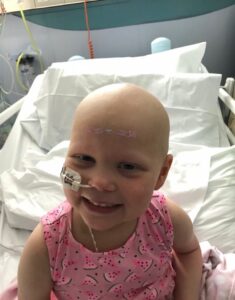 Treatment for Mollie started about one week after her diagnosis.
Treatment for Mollie started about one week after her diagnosis.
“Putting in the Hickman line for her treatment was awful – she’s still petrified of needles. The chemotherapy hit her quite hard. She stopped walking again, her hair fell out and steroids made her angry and hungry. Before she had been a fun-loving happy-go-lucky child, and it was awful as it felt like we were doing this to her. We told Phoebe that Mollie had poorly blood and her medicine was making her hair fall out. We couldn’t say to her it was cancer.”
Following two weeks’ initial treatment at Birmingham Children’s Hospital, Mollie was sent home but had to return there weekly for chemotherapy and regular bone marrow tests.
“She went back to school, she began walking again and seemed to be more Mollie again. We felt positive that we could cope with the rest of the treatment and like we could see the end in sight. But, six months before the end of treatment, a blood test came back that she was neutropenic (with low levels of infection-fighting white blood cells) when she shouldn’t have been. A bone marrow biopsy confirmed Mollie had relapsed.
“Again, it was a total shock – just as we thought life was getting better. Phoebe asked me if Mollie was going to die. I just said of course not. As a parent you’re just never ready for that conversation.”
Mollie was scheduled for a bone marrow transplant and began intensive pre-treatment in February. She was so poorly that she ended up staying in Hospital for four months.
“I took sick leave, Ashley is a self-employed carpenter so carried on working and came to visit mainly on the weekends. Other parents at the hospital were going through it too – I met some really lovely people there. In fact, it was harder being at home because then I was around people doing normal things, which we weren’t.”
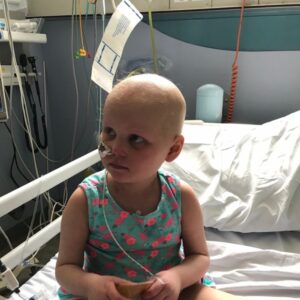
Mollie the day of bone marrow transplant
Mollie had her transplant in June 2018 from a donor in America followed by another month in hospital whilst she recovered.
“Then we went home and had to adjust to that. It was harder this time as she couldn’t mix with people. She could play with other children at hospital so she couldn’t understand why she couldn’t now go to the park or back to school. Life returned to a sort of normal but then, nine months after the transplant, she relapsed again. We couldn’t believe it and the doctors were surprised too.”
Lucie and Ashley knew about the new CAR-T cell therapy. Currently, NICE has approved CAR-T use in the NHS where all other treatment options have been unsuccessful for relapsed B-cell ALL or cases that don’t respond to treatment in people up to the age of 25 years. This approval for children was granted in 2018. The doctors said it would be the best option for Mollie.
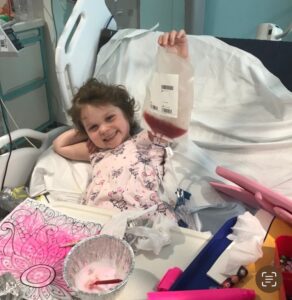 “Mollie had her cells taken in July and they were sent to America to be modified into cancer fighting cells. She was showing CD19 and CD22 cells and the CAR-T would only target C19 so she also had immunotherapy for the CD22. She had her modified cells back in August 2019 and thank goodness she tolerated it well.”
“Mollie had her cells taken in July and they were sent to America to be modified into cancer fighting cells. She was showing CD19 and CD22 cells and the CAR-T would only target C19 so she also had immunotherapy for the CD22. She had her modified cells back in August 2019 and thank goodness she tolerated it well.”
After three weeks, Mollie went home in time for her 7th birthday in September. She recovered well. Her first check-up bone marrow test was scheduled a month after her transplant. The awful news was that it still showed signs of leukaemia.
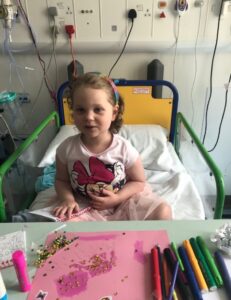
Mollie in hospital post CAR-T Treatment
“They told us they didn’t think it had worked and there was no other treatment available. It was our last hope and ironically, she looked amazing and was thriving at that point. But – and I will never forget this – they told us to take her home and just enjoy her.”
The devastated couple went home with Mollie and tried to come to terms with the news. But then the next monthly test yet again turned their lives upside down. It was clear.
“The doctors were shocked. They said the CAR-T must have kept working and mopped up what was left. They were so convinced it hadn’t worked. But they were so happy. We tried not to get too excited as she would need ongoing monitoring with monthly tests. But they all went well. And a year later, they said you don’t need any more tests, it’s worked.”
Mollie is now five years on from her treatment and, at 12 years old, has just started secondary school. She loves dancing and hanging out with her friends. The treatment has left her with some issues with her lungs, and she still is on immunoglobulin replacement therapy for her lack of B-Cells.
“The doctors say the B-Cells may return, but we don’t know for sure, and every child is different. She gets colds and chest infections, and they tend to hang around a while but, if I’m honest, not as much as I thought. In grand scheme of things, we’ll take that. We’re so grateful.
“Some of it I’ve tried to block out. We’ll never be a happy-go-lucky family, and my husband and I worry about a lot of things. We’re in debt because of it – we had to borrow money to pay the mortgage. Covid, which came right after her CAR-T therapy, didn’t help either. We want to go out and enjoy things but financially and mentally we can’t. By contrast, Mollie seems quite unscathed by it. She does remember hospital and talks about it a bit. When she does, I always answer her questions.
“If I had the choice now between a bone marrow transplant and CAR-T I would go straight to CAR-T. The transplant was so invasive and the chemotherapy and radiotherapy ahead of it has caused long term issues. I hope in the future they can give CAR-T as a first line treatment. If it wasn’t for that she wouldn’t be here. I will never forget them telling us to take her home and enjoy her. I’m so grateful she’s still with us.”
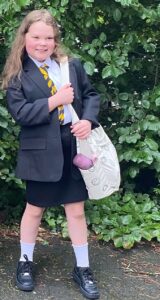
Mollie starting secondary school, 5 years off treatment
Related posts
17 April 2024
“Every little thing is gonna be alright” – three little birds tattoo marks mum’s recovery from one of the least survivable cancers
New research by Leukaemia UK which could reduce the side-effects of treatment for acute myeloid leukaemia (AML) welcomed by family affected by the disease. A family who was devastated when…
1 August 2022
Who’s Cooking Dinner? to return on Monday 19th September
Who’s Cooking Dinner reveal all star Chef Line Up Famed Charity event to return on Monday 19th September For the past 24 years, Leukaemia UK, the leukaemia research charity dedicated…
18 July 2021
Open letter from cancer charities to the public
40 charities and organisations have written an open letter, urging the public to help keep vulnerable people safe as restrictions ease.
31 October 2022
Leukaemia UK appoints new Director of Communications job share from Shelter to lead their ambitious strategy
Blood cancer research charity, Leukaemia UK, has hired Anna Wilson and Lizzie Afonso from housing and homelessness charity, Shelter, to job-share its new Communications Director role. This is the first…